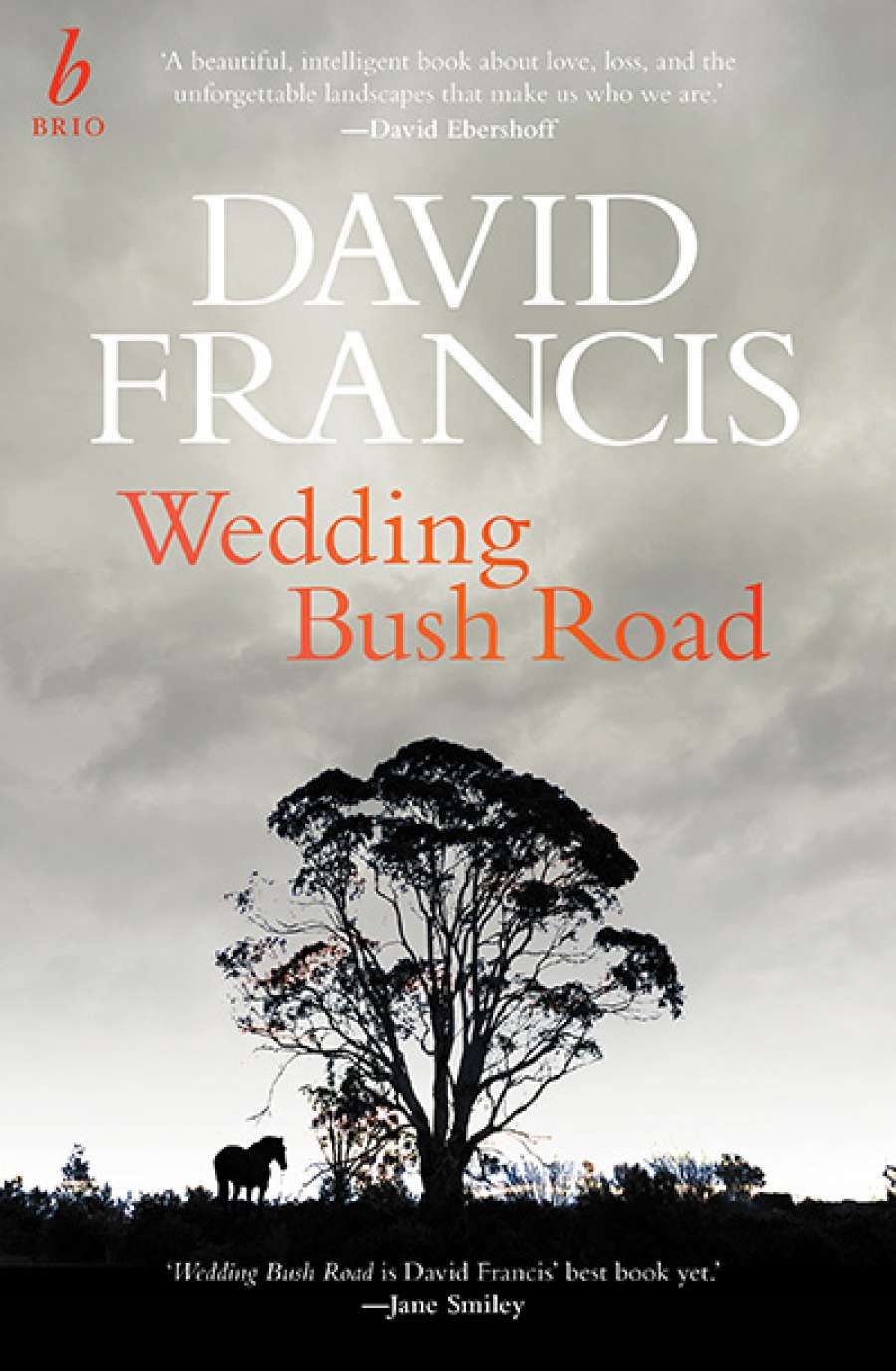
- Free Article: No
- Contents Category: Fiction
- Custom Article Title: Fiona Gruber reviews 'Wedding Bush Road' by David Francis
- Review Article: Yes
- Online Only: No
- Book 1 Title: Wedding Bush Road
- Book 1 Biblio: Brio Books $29.99 pb, 288 pp, 9781925143331
Daniel’s assiduous exfoliation of his youthful self means that he is thin-skinned and out of his depth when revisiting its pungent demands and clamouring, sly, argumentative characters. He is immediately wrong-footed by the new cottage tenants who roam the farm and house. There is Reggie, an elusive, almost elvish youth who appears at odd times of the day and night and seems to have a hold over Ruthie. Reggie’s mother Sharen, a woman of earthy charms, seems to be having an on-off affair with Earley, Daniel’s father. Despite a dicky hip and a pensioner’s bus pass, Earley is a tireless philanderer, which is why Ruthie kicked him out years ago. Then there is Walker, the most alarming of the players, Sharen’s ex, a fitful presence in the night, up to mischief and prone to violence.
The whole set-up, as the reader quickly discovers, is dysfunctional, laced with malevolence, and straight out of the Rural Gothic Songbook, with touches of Cold Comfort Farm. Who will inherit the property? Who will surrender to a lustful farmyard rut? Who will survive the night?
Francis’s sketches of landscapes and people are intense vignettes, particularly evocative when he conjures the dry paddocks and ‘familiar cacophony of crickets’ of high summer, and painfully sharp when describing the cruelties of old age. Stroke-ravaged Ruthie, nightie tucked into baggy jeans, has hair sticking up on one side ‘like a sea wall’ and is ‘thin as a picket’. Earley, still trying to charm the local girls while sagging on his broken hips, wears a face ‘rutted as a quarry’.
Ruthie is the key to the unfolding drama. Francis is acute in his portrayal of the mother–son dynamic; her mixed messages and dismissive attitude towards her failing health enmesh Daniel in a web of guilt that ties him to the future as well as to the past. An offer of help is met with a half-hearted wave ‘as though letting me know she’s familiar with neglect’. Yet later, in the dark of the paddocks, she tells him ‘you’re the reason I stay alive’.
Australia is a backward place in Wedding Bush Road. Francis’s sketchbook renders it brutish and brutal, its denizens’ needs urgent and basic, their emotional intelligence almost non-existent. There is precious little Californian mindfulness or self-improvement, but more than a touch of William Faulkner in the concentration on place, on a disintegrating family, and the multiple voices that move the story forward.
 David FrancisFor those familiar with Francis’s previous novels, Agapanthus Tango (2001) and Stray Dog Winter (2008), Daniel is a familiar construct, a questing young man, charming and amorous, emotionally tangled, liable to get into scrapes, far-sighted but curiously blind to the bigger narrative in which he is embedded.
David FrancisFor those familiar with Francis’s previous novels, Agapanthus Tango (2001) and Stray Dog Winter (2008), Daniel is a familiar construct, a questing young man, charming and amorous, emotionally tangled, liable to get into scrapes, far-sighted but curiously blind to the bigger narrative in which he is embedded.
All of Francis’s male protagonists have troubled family relationships that compel them to leave but always draw them back. In interviews he has often spoken about the autobiographical elements running through his work. Like his protagonist, Francis is an expat lawyer living in Los Angeles who grew up on a horse farm in South Gippsland. For those familiar with that region, Toovareen is reminiscent of Tooradin; the nearby Tooradin Estate was the Francis family farm. Wedding Bush Road is dedicated to David Francis’s mother, Judith Francis, a horsewoman of renown, with many of the qualities and achievements of the fictional Ruthie Rawson.
The blend of fiction and documented autobiographical anecdote adds layers of interest to those with a curiosity for the life of the author. But one needs to know nothing of the real-life characters stalking these pages to be held by the novel’s exploration of defiant old age, love of land, and a family in decline.


Comments powered by CComment